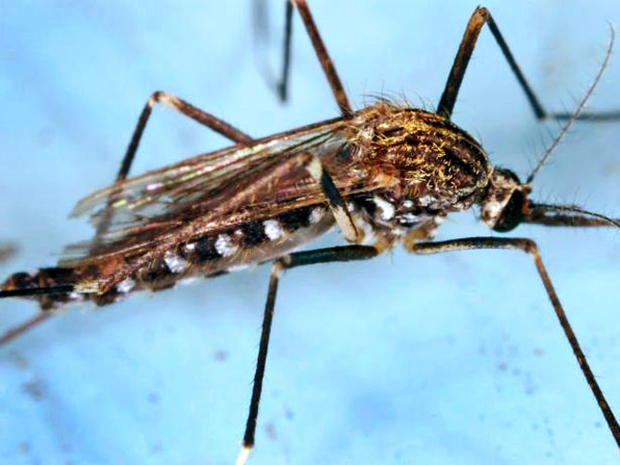CDC: "Dramatic" jump in West Nile virus cases as US faces one of largest outbreaks ever seen
(CBS News) West Nile virus is well on its way to a record year in the United States. The Centers for Disease Control and Prevention (CDC) announced in a conference call with reporters on Wednesday that a total of 1,118 cases of the disease have been reported across 38 states, including 41 deaths.
Watch: Outcome of spraying to combat West Nile virus unclear
West Nile virus outbreak: How to protect yourself
More West Nile virus cases, deaths add to growing concern around U.S.
Dr. Lyle Peterson, director of the division of vector-borne infectious diseases at the CDC, told reporters that the infection has been found in mosquitoes or birds in 47 states as of Tuesday August 21, the last day the agency collected data. The only states not reporting West Nile activity are Alaska, Hawaii and Vermont.
Since 1999, the first time West Nile Virus was detected, there has never been as many reported cases through the third week in August, leading Peterson to proclaim the country is in the midst of "one of the largest West Nile outbreaks ever seen."
More than 30,000 people in the U.S. have come down with the West Nile virus since 1999, according to the CDC. Mosquitoes get the virus when they feed on infected birds, and then pass it through bites to to humans and other animals .
About 80 percent of people who are infected with the virus won't show any symptoms, but for 20 percent they may develop a fever, headache, body ache, vomiting, swollen lymph glands or a skin rash, what officials refer to as "West Nile fever" or "non-neuroinvasive" West Nile.
But about one in 150 however will develop severe illness, which may result in high fever, neck stiffness, convulsions, vision loss, paralysis, coma and other neurological effects that may be permanent - or even death. That's called neuroinvasive West Nile virus. People over 50 and those with compromised immune systems are at the highest risk.
Despite how it may sound, Peterson warned that non-neuroinvasive forms are by no means mild, and people can have symptoms such as fatigue that last weeks to months. He himself contracted West Nile virus in 2003. Peterson said one day he went for a jog feeling perfectly normal and by the end of it he couldn't walk, which shows how rapidly symptoms can come on.
The CDC also noted a "dramatic" rise in cases in recent weeks - last month Peterson said there were only 25 people reported infected with West Nile. Of all the cases, 629 or 56 percent, were classified as neuroinvasive disease, which may lead to dangerous conditions like meningitis or encephalitis. The remaining 489 (44 percent) were considered non-neuroinvasive. He added rates will likely pick-up since weekly CDC estimates mostly reflect people who were sick the week prior.
"We don't really know why it's worse this year than in previous years" Peterson said, however he noted that the unseasonably hot weather from the mild winter and early spring and summer may play a role.
Of all the reported cases, 75 percent are found in Texas, Mississippi, Louisiana, South Dakota and Oklahoma. Half of all reported cases are in Texas, the CDC said.
Dallas County specifically has been hit hard. Dr. David Lakey, commissioner of the Texas Department of State Health Services who also spoke on the call with reporters, said there have been 270 cases of West Nile virus in the county, 142 of which were neuroinvasive, and there had been 11 deaths in the county alone.
From 2003 to 2011, Lakey said Dallas had only seen 10 West Nile virus deaths. Statewide rates, which Lakey said differed a bit from the CDC's, show that there have been 586 cases of West Nile including 21 deaths throughout Texas. More than three hundred of the cases were neuroinvasive, and in over 90 percent of those cases, people needed to be hospitalized.
"It's not just about the numbers, we're talking about a disease that impacts the lives of hundreds or thousands of folks whose lives will be permanently changed by this outbreak," Lakey said.
While Dallas and other cities have taken to aerial spraying of insecticides, officials warned this won't kill all the mosquito sources, especially if it rains and there is stagnant water left where mosquitoes may breed.
"Therefore it is important for people to continue taking steps to prevent mosquito bites," Peterson said at the press conference.
People should apply insect repellantthat contains an EPA-registered active ingredient, such as DEET, to skin or clothing before they head outdoors, and should wear long clothing during dusk and dawn, prime-hours for mosquito bites. Health officials also recommend draining standing water to prevent mosquitoes from breeding.

